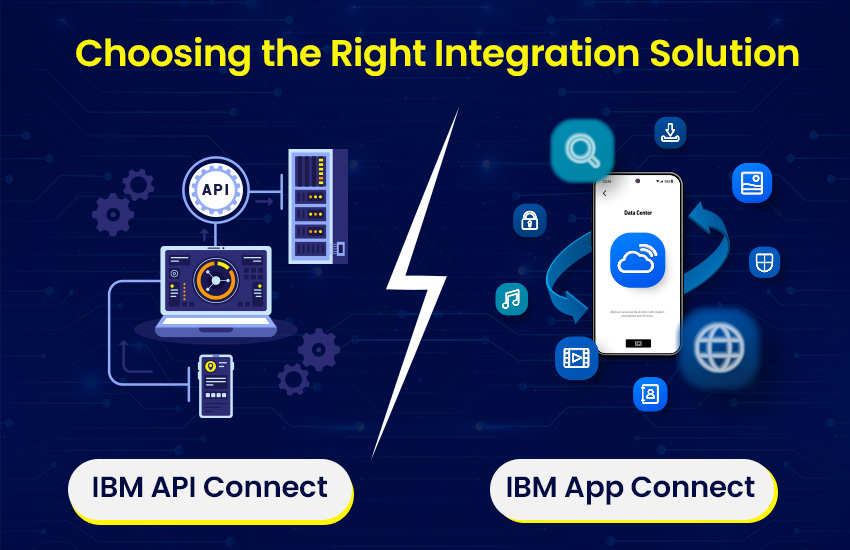
IBM APP Connect vs API Connect
In the current digital technology world, connecting applications with datasets is most important to achieve great success. To implement this IBM offers two powerful integration solutions i.e. IBM APP Connect & API Connect - each solution used for different aspects of enterprise integration. Understanding their features, differences, and use cases can help businesses select the right tool for their needs.
Need for Integration
As enterprises grow, they face challenges in integrating systems while ensuring security, efficiency, and scalability. Key objectives for integration include:
- Enhancing business value through new revenue streams and cost optimization
- Improving IT efficiency by streamlining operations
- Seamless data transformation across cloud and on-premise environments
- Offers security in an evolving digital ecosystem
What is IBM API Connect?
IBM API Connect is an integrated API management solution designed to create, secure, manage, and socialize APIs across cloud and on-premises environments. By implementing this solution organizations can automate workflow & integrate their systems without using any programming language. This platform allows companies to process the data in real time by eliminating human efforts & maintaining quality of work to increase productivity.
What is IBM App Connect?
IBM App Connect can be considered as a modern integration platform that enables businesses to connect various applications and data sources, both on-premises and in the cloud. It provides many tools for API integration for designing, developing, testing, and deploying APIs. By using this solution companies can secure the data.
IBM App Connect vs. API Connect: Features Comparison
To stay competitive, businesses prioritize digital transformation, making seamless integration between applications, systems, and APIs a key KPI for maximizing ROI. Lets understand the difference between these 2 solutions in terms of key features.
Key Differences: IBM App Connect vs. IBM API Connect
|
Feature |
IBM App Connect |
IBM API Connect |
|
Primary Purpose |
Application and system integration |
API lifecycle management and security |
|
Use Case |
Connecting applications, automating workflows |
Creating, managing, securing, and monetizing APIs |
|
Integration Type |
App-to-App, Cloud-to-On-Premise, Hybrid Integration |
API-first approach, external and internal API management |
|
API Capabilities |
Supports API-based integration but not full API management |
Full API lifecycle management, including monetization |
|
Automation |
Visual workflow automation for business processes |
API security, governance, and analytics |
|
Security Focus |
Ensures secure data exchange between integrated systems |
Advanced API security with OAuth, JWT, TLS encryption |
|
User Base |
Business users, IT teams, and developers |
API developers, security teams, IT administrators |
|
Best For |
Businesses needing fast, low-code integration |
Organizations with API-driven business models |
How to select the best integration solution?
Deciding between IBM API Connect and IBM App Connect is like choosing the right thread for your tapestry. If you need a strong API management platform for creating new digital channels and revenue streams, API Connect is the way to go. On the other hand, if you require quick integration across applications with minimal coding, App Connect seamlessly integrates into your operations.
Both solutions are powerful, and understanding their strengths and alignment with your business goals is crucial for making the best choice.
FAQS
What is the difference between IBM App Connect and API Connect?
IBM App Connect can integrate applications and automate workflows to ensure seamless data exchange across different systems. IBM API Connect is designed for API lifecycle management, to create, manage, and expose APIs for external use very securely.
Can IBM App Connect and IBM API Connect be used together?
Yes. IBM App Connect integrates various systems and applications, while IBM API Connect secures and manages the APIs that expose these integrations to external users or partners.
Which tool is better for automating workflows between cloud applications?
IBM App Connect is the better choice for workflow automation between cloud applications. It provides pre-built connectors, templates, and a low-code interface to streamline integrations without extensive coding.
Talk to Our Expert
Our Services
ISO 20022 (MT to MX) Adoption & Migration
FTM For Corporate Payment Services
IBM Cloud Park For Integration (CP4i)
